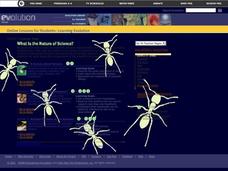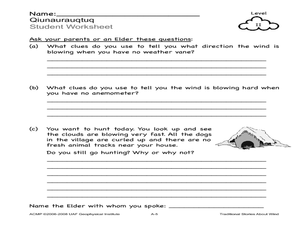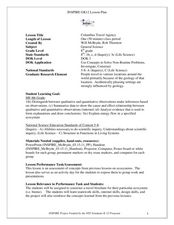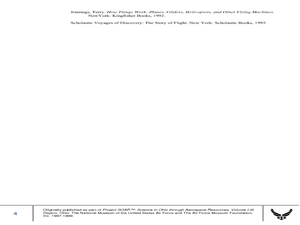Curated OER
What is the Nature of Science?
Students examine videos of field researach to discover the components of the scientific process. Using forms, they conduct community surveys about the nature of science. They research the extinction of dinosaurs and compare...
Curated OER
Observing Sea Ice
Students study and observe types of sea ice found in Alaska. In this sea ice lesson, students use the student network for observing weather to study the different types of sea ice. Students study sea ice depicted in Alaskan art.
Curated OER
Settlement Exploration: Then and Now
NASA has crafted an imaginative and memorable series of lessons, "NASA and Jamestown Education Module." This lesson is one of the five components. In it, middle schoolers connect history and science by comparing the settlement of...
NASA
Radiation Shielding on Spacecraft
Here is a terrific science lesson for your elementary schoolers. In it, learners analyze different materials to simulate space radiation shielding on spacecraft, then select the best material to use to build one. This is a classic...
NASA
Let's Investigate Mars
Take your science class on a hypothetical field trip to Mars with an engaging astronomy lesson. After first learning about NASA's Mars rover missions, young scientists plan their own scientific investigations of Earth's...
Curated OER
Archaeology
Students compare and contrast the role of scientists with that of archaeologists. They also describe the roles of observations and evidence in science.
Curated OER
Traditional Stories about Wind
Students observe and talk about wind using no weather instruments. In this wind lesson plan, students use their senses to observe wind. They also interview an Elder about wind.
Curated OER
Project 1
Young scholars are given a coin to observe and make inferences about. Using a worksheet, they make two columns to list their observations and inferences in an organized manner. They develop a hypothesis based on one of the inferences...
Curated OER
Recycling!
The young scholars recall events from Dr. Seuss' story The Lorax and make connections to environmental issues affecting their lives. They are expected to reflect on the facts of the story and respond verbally stating the inferences they...
Curated OER
Cooler in the Shadows
Students explore Earth science by creating a scale model in class. In this shadow activity, students research the impact the sun has on Earth shadows and complete a space science worksheet. Students create models of the Sun and Earth and...
Curated OER
Look Alikes
Third graders compare and contrast the physical features of parents and offspring. In this life science lesson, 3rd graders classify a set of animal pictures according to their similarities. They share and explain their work in class.
Curated OER
The Great Heat Escape
Students observe a demonstration on the role of thermal conductivity in heat transfer. In this thermal conductivity lesson, students design and conduct an experiment to compare the thermal conductivity of four substances....
Curated OER
QuickPlan: Mystery Boxes
Primaries explore the concepts of observation and inference. Given a set of six sealed boxes, children lift, tip, or gently shake in order to make observations about what is inside. The lesson plan gives preparation instructions in...
Curated OER
Veggie Chop and Data Analysis
First graders chop vegetables into fractions. In this fractions lesson plan, 1st graders cut vegetables, collect data about favorite vegetables and create a bar graph using the information. Students make inferences about the data...
Curated OER
Columbus Travel Agency
Eighth graders research about their chosen ecosystem. In this life science lesson plan, 8th graders play the role of travel agents and create a travel brochure. They share this in class.
Curated OER
Parachutes: Is it Surface Area or Shape?
Students investigate how to make a good parachute. In this physics lesson, students observe the motion of parachutes as it falls and measure the time. They collect data and calculate the average descent time for each canopy shape.
Curated OER
Designing a Crew Exploration Vehicle
Take your class on an out-of-this-world adventure with this fun engineering design lesson plan. Working in small groups, young scientists design, build, and test crew exploration vehicles using some creativity, teamwork, and...
Curated OER
Seein' Double, Seein' Double
By using the Internet, hands-on activities, video, and cooperative learning, pupils look into the conditions in which light casts shadows on objects. The lesson includes fabulous hands-on activities, art projects, worksheets, and reource...
Curated OER
Designing a Real Life Ecosystem!
Students research abiotic and biotic factors concerning the concept of an ecosystem. Record and analyze data collected. Write a lab report in proper and scientific format with thinking and analytical skills. Work as a cooperative team.
Curated OER
Classification of Animals
Middle schoolers explore animal characteristics by participating in a SMART board activity. In this animal classification lesson, students utilize a sorting chart to divide different animal names by their observable characteristics....
Curated OER
What We Know About Dinosaurs?
Third graders determine what can and cannot be learned from fossils. In this fossils lesson, 3rd graders discuss what can and cannot be learned from fossils, then students create and observe their fossils.
Curated OER
Potential and Kinetic Energy
Sixth graders explore potential and kinetic energy. In this science lesson, 6th graders assume the role of a roller coaster engineer and design a roller coaster. Students use their knowledge of kinetic and potential energy to design a...
Curated OER
Personal Ecosystem
Students build an aquatic ecosystem using large glass pickle jars. In this ecology lesson, students build and ecosystem then observe and collect data on the habitats. In this long term project students observe a...
Curated OER
Hero Or Zero?
Learners investigate science and technology by reading a children's book. In this reading comprehension lesson, students read the story Archibald Frisby and discuss the ways we use science and technology in everyday life....























